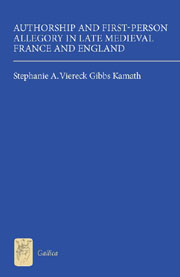Book contents
- Frontmatter
- Contents
- Dedication
- Acknowledgements
- Abbreviations
- A Note on Names, Sources, and Translations
- Introduction
- 1 “Comment ot nom”: Allegory and Authorship in the Roman de la Rose and the Pèlerinage de la Vie Humaine
- 2 “What so myn auctour mente”: Allegory and Authorship in Geoffrey Chaucer's Dreams
- 3 “Thereof was I noon auctour”: Allegory and Thomas Hoccleve's Authority
- 4 Verba Translatoris: Allegory and John Lydgate's Literary Tradition
- Coda
- Bibliography
- Index
- ALREADY PUBLISHED
1 - “Comment ot nom”: Allegory and Authorship in the Roman de la Rose and the Pèlerinage de la Vie Humaine
Published online by Cambridge University Press: 05 February 2013
- Frontmatter
- Contents
- Dedication
- Acknowledgements
- Abbreviations
- A Note on Names, Sources, and Translations
- Introduction
- 1 “Comment ot nom”: Allegory and Authorship in the Roman de la Rose and the Pèlerinage de la Vie Humaine
- 2 “What so myn auctour mente”: Allegory and Authorship in Geoffrey Chaucer's Dreams
- 3 “Thereof was I noon auctour”: Allegory and Thomas Hoccleve's Authority
- 4 Verba Translatoris: Allegory and John Lydgate's Literary Tradition
- Coda
- Bibliography
- Index
- ALREADY PUBLISHED
Summary
Guillaume de Deguileville's fourteenth-century pilgrimage allegories were among the most widely traveled literary texts of the Middle Ages. The Pèlerinage de la Vie Humaine (PVH) (Pilgrimage of Human Life), composed c. 1331, describes the journey through life as a pilgrimage toward the heavenly city of Jerusalem; Deguileville revised this allegory (c. 1355) before he composed two more pilgrimage allegories. The Pèlerinage de l'Âme (PA) (Pilgrimage of the Soul) (c. 1355) continues the first allegory, recounting the journey through heaven and hell taken by the pilgrim's soul, while the Pèlerinage de Jhesucrist (PJC) (Pilgrimage of Jesus Christ) (c. 1358) envisions the life of Jesus in the form of another pilgrimage. Before the mid-sixteenth century, portions of the pilgrimage trilogy had inspired translations in English, Dutch, German, Latin, and Castilian, in addition to adaptations into drama and prose forms in French. Philippe de Mézières proclaimed Deguileville's allegory necessary to those seeking the holy sites of the East and Deguileville's allegory also drew near to the far West when Christopher Columbus drew names for new world islands from the Castilian translation. But the foreign shore offering the warmest literary reception to Deguileville's pilgrim was certainly England. Deguileville's allegory shares structural and thematic elements with Piers Plowman and, as the next chapter will discuss, had an indisputable influence on Geoffrey Chaucer, whose only known complete translation from a single French source, the ABC, renders an acrostic lyric from the PVH.
- Type
- Chapter
- Information
- Publisher: Boydell & BrewerPrint publication year: 2012



